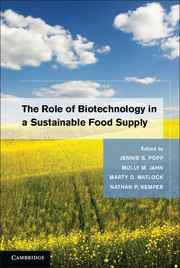12 results
The Role of Biotechnology in a Sustainable Food Supply - Title page
-
-
- Book:
- The Role of Biotechnology in a Sustainable Food Supply
- Published online:
- 05 June 2012
- Print publication:
- 31 January 2012, pp iii-iii
-
- Chapter
- Export citation
Abbreviations
-
- Book:
- The Role of Biotechnology in a Sustainable Food Supply
- Published online:
- 05 June 2012
- Print publication:
- 31 January 2012, pp xix-xxii
-
- Chapter
- Export citation
Preface
-
- Book:
- The Role of Biotechnology in a Sustainable Food Supply
- Published online:
- 05 June 2012
- Print publication:
- 31 January 2012, pp xi-xii
-
- Chapter
- Export citation
Contents
-
- Book:
- The Role of Biotechnology in a Sustainable Food Supply
- Published online:
- 05 June 2012
- Print publication:
- 31 January 2012, pp v-x
-
- Chapter
- Export citation
Editors
-
-
- Book:
- The Role of Biotechnology in a Sustainable Food Supply
- Published online:
- 05 June 2012
- Print publication:
- 31 January 2012, pp xiii-xiii
-
- Chapter
- Export citation
Contributing Authors
-
-
- Book:
- The Role of Biotechnology in a Sustainable Food Supply
- Published online:
- 05 June 2012
- Print publication:
- 31 January 2012, pp xiv-xviii
-
- Chapter
- Export citation
5 - Biotechnology and the Control of Viral Diseases of Crops
-
-
- Book:
- The Role of Biotechnology in a Sustainable Food Supply
- Published online:
- 05 June 2012
- Print publication:
- 31 January 2012, pp 77-89
-
- Chapter
- Export citation
Index
-
- Book:
- The Role of Biotechnology in a Sustainable Food Supply
- Published online:
- 05 June 2012
- Print publication:
- 31 January 2012, pp 267-274
-
- Chapter
- Export citation

The Role of Biotechnology in a Sustainable Food Supply
-
- Published online:
- 05 June 2012
- Print publication:
- 31 January 2012
Copyright page
-
- Book:
- The Role of Biotechnology in a Sustainable Food Supply
- Published online:
- 05 June 2012
- Print publication:
- 31 January 2012, pp iv-iv
-
- Chapter
- Export citation
The Role of Biotechnology in a Sustainable Food Supply - Half title page
-
- Book:
- The Role of Biotechnology in a Sustainable Food Supply
- Published online:
- 05 June 2012
- Print publication:
- 31 January 2012, pp i-i
-
- Chapter
- Export citation
Dedication
-
- Book:
- The Role of Biotechnology in a Sustainable Food Supply
- Published online:
- 05 June 2012
- Print publication:
- 31 January 2012, pp ii-ii
-
- Chapter
- Export citation



